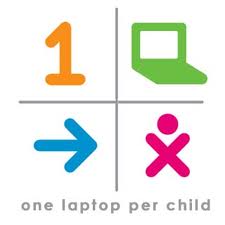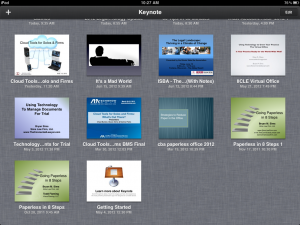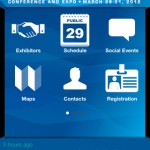I was recently interviewed for a article for the Daily Herald Business Ledger. In  the article I talk about how I use an iPad in my practice. They even sent a photographer out to take my picture. The picture was taken in the common area in my building. You can find the article online.
the article I talk about how I use an iPad in my practice. They even sent a photographer out to take my picture. The picture was taken in the common area in my building. You can find the article online.
Bryan Sims
Kane County Bar Association
by
Today I am speaking at a CLE conference for the Kane County Bar Association. I will be speaking with Jack Grewer about using an iPad in a law practice.
I love my iPad and use it all the time in my practice. Therefore I am always happy to talk to other lawyers about how to integrate an iPad into a law office.
Service by Email Comes to Illinois
by
Recently the Illinois Supreme Court adopted an amendment to Supreme Court Rule 11, which deals with service of documents to opposing parties. This amendment, which takes effect January 1, 2013, allows attorneys to serve documents by email and it requires attorneys to provide an email address for service on all appearances and pleadings.
I think this is a great change. Admittedly, I think the rule requires some refinement (e.g., what formats are appropriate, when is email service effective). However, on the whole, I think this is a great step forward.
 Not unexpectedly, however, there has been a significant outcry from members of the bar who are raising objections to this. Some of the objections that I see include the typical claims that this discriminates against attorneys who are not technologically savvy and that it provides no exemption for attorneys who do not have an email address.
Not unexpectedly, however, there has been a significant outcry from members of the bar who are raising objections to this. Some of the objections that I see include the typical claims that this discriminates against attorneys who are not technologically savvy and that it provides no exemption for attorneys who do not have an email address.
Excuse me, but that is the most ridiculous thing that I have heard. I was doubly struck by the ridiculousness of the statement when I recently read an article about the One Laptop Per Child Program. This program aims to increase education by providing educational software to children in third world countries.
I recently read an article in which OLPC distributed Motorola Xoom tablets in Ethiopian villages. Significantly, the tablets were “distributed” by leaving them in sealed boxes in the middle of the village. Further, the village was one in which the children were illiterate. In fact, neither the children nor almost all of the adults in the village had never before seen the written word.
Notably, the children were provided with absolutely no instruction at all. OLPC monitored these devices and what the learned was amazing:
We left the boxes in the village. Closed. Taped shut. No instruction, no human being. I thought, the kids will play with the boxes! Within four minutes, one kid not only opened the box, but found the on/off switch. He’d never seen an on/off switch. He powered it up. Within five days, they were using 47 apps per child per day. Within two weeks, they were singing ABC songs [in English] in the village. And within five months, they had hacked Android. Some idiot in our organization or in the Media Lab had disabled the camera! And they figured out it had a camera, and they hacked Android.
Think about it. Within 5 months, these children, who were not only illiterate, but also had never before seen the written word, were able to hack the security on the tablet to enable the camera.
I think if illiterate children in a third world country can manage to do that, then highly educated attorneys can figure out a way to obtain and manage an email address.
Although not related to OLPC project or email specifically, I find the following video on point.
Gizmos, Gadgets & Widgets
by
Recently I had the honor of presenting with Nerino Petro at the ISBA Solo and Small Firm Conference. One of the sessions that we did was a Gizmos, Gadets & Widgets session at 8:30 on Saturday morning. I was pleasantly surprised with the number of people who turned out early Saturday morning for the presentation.
 As usual, we had great fun with this presentation. At the session, we mentioned that we would make our presentation available on my site. Thus, you can now download a PDF of our presentation Gizmos, Gadgets & Widgets. You can also find this and many other files on my Files page.
As usual, we had great fun with this presentation. At the session, we mentioned that we would make our presentation available on my site. Thus, you can now download a PDF of our presentation Gizmos, Gadgets & Widgets. You can also find this and many other files on my Files page.
If you have any questions on any of the items, feel free to contact either Nerino or myself.
The Legal Practice Landscape
by
On Friday, June 15 ,2012, I will be part of a panel speaking about The Legal Practice Landscape: Thriving in a Climate of Change.
This is a CLE sponsored by the ISBA at its annual meeting. However, you need not attend the annual meeting if you just want to attend the CLE.
 During the program the other panelists and I will share information you need to know about current and future changes affecting the practice of law as well as some tips on how to prepare for and adapt to those changes. We will facilitate discussions among attendees and offer our insights on some of these topics: the shifting paradigm of the practice of law; the information tsunami and how to use it to your benefit; generational preferences and practices; technological changes and positive ways to embrace them; and what it means to you; social media – pluses and minuses; and business trends impacting the legal profession.
During the program the other panelists and I will share information you need to know about current and future changes affecting the practice of law as well as some tips on how to prepare for and adapt to those changes. We will facilitate discussions among attendees and offer our insights on some of these topics: the shifting paradigm of the practice of law; the information tsunami and how to use it to your benefit; generational preferences and practices; technological changes and positive ways to embrace them; and what it means to you; social media – pluses and minuses; and business trends impacting the legal profession.
You can find further information about the presentation here.
If you need professionalism credit, please note that this presentation has been approved for 3 hours of professionalism credit.
Photo courtesy of Shutterstock
Use Encryption Responsibly
by
Without question, as attorneys we need to take reasonable steps to keep our data secure. This is because much of the data that we have includes information that we are obligated to keep confidential. Because of this, I recommend that if you are keeping client information on a laptop, that you use whole disk encryption on the device.
 Further, I recommend that people really think about the information that they are sending out and question whether email is the best way to send the information. In reality, there is some information that might be so confidential, that it should be transmitted from trusted individual to trusted individual.
Further, I recommend that people really think about the information that they are sending out and question whether email is the best way to send the information. In reality, there is some information that might be so confidential, that it should be transmitted from trusted individual to trusted individual.
That all being said, there are also steps that you can take protect information when sending it via email. For example, it is relatively simply to use Adobe Acrobat to encrypt a file or to control what the recipient does with the file.
However, this is a decision that requires the exercise of discretion. You should not simply encrypt every file that you send out. For example, I was recently involved in a real estate transaction in which, because of the listing agreement signed by my clients, I was obligated to use a title company that I do not normally use.
When the title company sent me the title commitment, they sent it via email. From my perspective, this was great. However, they sent it in an encrypted PDF. I completely fail to understand why, however.
When you think about it, the information that is contained within the title commitment is the information that is publicly available at the recorder’s office. Quite simply, by definition, there is not going to be any confidential information in the title commitment.
However, the thing that made this whole situation really ridiculous is that, in the email in which they sent me the encrypted file, the subject line read: “Password is XXXX.”
Yes, that is correct, they sent me an encrypted file containing only publicly available information and they included the password for that file as the subject of the same email.
This is like the perfect storm of applying security where it is not needed and doing so in a manner that is completely insecure and completely defeats any possible security.
Protecting Your Online Reputation
by
I recently had an article published in the ABA GP|Solo Magazine. It details steps you can take to protect your online reputation.
The article can be viewed online at here.
I Love Living in the Future
by
Right now I am in California (getting ready to visit the Googleplex–feel free to be jealous). Yesterday, for the first time, I flew on a flight that had in-flight Wi-Fi. The cost was reasonable ($5) and the flight was longer than I liked, so I decided to try the Wi-Fi.
The Wi-Fi worked fine and I had no problems using it. I love the fact that I was able to keep up with my email on the flight, so that when I landed, I didn’t have to spend the first hour after arrival playing email catch up.
While working through my email, I was able to experience the benefits first hand of going paperless and using a virtual fax service rather than an actual fax machine.
While somewhere over the great plains, I received an email from a client that I had represented two years ago. She told me that she needed me to fax something to someone related to what I had assisted her with two years ago.
Fortunately, I ran a paperless office that integrates with the cloud. This means that, from the airplane, I was able to retrive the document from Spider Oak. If I had my laptop, I would have been able to retrive it directly from my hard drive. However, I am traveling only with my iPad, therefore, I had to retrive the document from the cloud.
Finding the document was easy. Once I had the document, I had to fax it to the recipient. Because I use a virtual fax service, send this email was no different from sending an email.
Despite the fact that I was 38,000 feet in the air, in about a total of 10 minutes time, I had received the email, retrieved the requested document from a case that had been closed for two years, and had faxed it to the person my client wanted to have it.
Without technology, obviously none of this would have been possible. Because of the technology, however, I was able to handle this task quickly and efficiently, regardless of my location.
ABA Techshow App
by
There were lots of things that I loved about going to and speaking at ABA Techshow this year. It was great to see old friends and meet new ones. I saw some great presentations and learned lots of new information.
 The one thing that I got to experience that was new to me, however, was the Techshow App. It was a conference app that I was able to download to both my Android phone as well as my iPad.
The one thing that I got to experience that was new to me, however, was the Techshow App. It was a conference app that I was able to download to both my Android phone as well as my iPad.
The app gave me easy access to the complete schedule, speaker bios, written materials, exhibitors, etc. In short, it was a wealth of information that was easily accessible from both my phone and my tablet.
There were two features that I really liked about the app. First, I could mark certain sessions as favorites. This put those items on a separate calendar. This way I could narrow down the sessions that I wanted to attend and easily see this in simple view. I would then know where I needed to be and the time that I needed to be there.
The second feature that I really liked was the fact that I could complete the evaluation form from inside the app. There was no need to keep track of the evaluation form and turn it in. Instead, I could complete the evaluation (for both individual sessions and the conference as a whole) from within the app.
In short, I found the app very useful and easy to use and I absolutely loved the fact that I had all of the information I needed in an easily accessible format that was entirely electronic.
If you are planning a conference, I urge you to check into an app such as this. It seemed very popular at the show and I absolutely loved it.
The app was developed by Crowd Compass. I had the pleasure of meeting their General Counsel at the show. However, I fell in love with the app before I found out how cool he was.
A Podcast Interview from ABA Techshow
by
While I was at ABA Techshow, I had the privilege of participating in a short podcast interview with Christy Burke.
 We spoke just after the conclusion of LexThink.1. As an aside, I really enjoyed the presentations this year. When the videos hit the web site, I recommend that every attorney view them.
We spoke just after the conclusion of LexThink.1. As an aside, I really enjoyed the presentations this year. When the videos hit the web site, I recommend that every attorney view them.
Anyway, Christy grabbed me after the programs and we did a short interview (about 3 minutes or so). You can listen to the interview here. I stumbled a bit over the question of how long I have had my blog. On top of that, I got the answer wrong.
Looking at my posts, it appears that my first post was January 14, 2007. So to answer Christy’s question, I have been blogging here for five years. Other than that, I will stand on my other answers.
